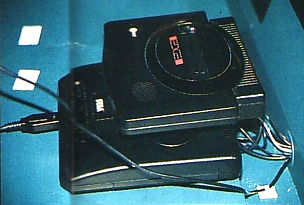Difference between revisions of "Edge 16"
From Sega Retro
| Line 1: | Line 1: | ||
{{AccessoryBob | {{AccessoryBob | ||
| accessoryimage=Edge16 MD.jpg | | accessoryimage=Edge16 MD.jpg | ||
| − | |||
| accessoryprogramscreen= | | accessoryprogramscreen= | ||
| title= | | title= | ||
| maker=[[PF Magic]], [[AT&T]] | | maker=[[PF Magic]], [[AT&T]] | ||
| + | | type=Network tool | ||
| madefor=[[Sega Mega Drive]] | | madefor=[[Sega Mega Drive]] | ||
| + | | alsoworks= | ||
}} | }} | ||
| − | + | {{sub-stub}}'''''{{PAGENAME}}''''' is an unreleased [[Sega Mega Drive]] modem created as a joint venture between [[PF Magic]] and [[AT&T]]. | |
The Edge 16 was a device to be inserted into the cartridge slot of a Mega Drive console, allowing two players to compete with Mega Drive games through the internet - control pad signals would be sent through the phone line, as would sounds from a microphone to allow players to communicate. A card slot at the front of the device would have been used to save game data to memory cards.{{magref|cvg|141|20}} A keyboard attachment was also shown, though few details are known about it. | The Edge 16 was a device to be inserted into the cartridge slot of a Mega Drive console, allowing two players to compete with Mega Drive games through the internet - control pad signals would be sent through the phone line, as would sounds from a microphone to allow players to communicate. A card slot at the front of the device would have been used to save game data to memory cards.{{magref|cvg|141|20}} A keyboard attachment was also shown, though few details are known about it. | ||
| Line 20: | Line 21: | ||
{{mainArticle|{{PAGENAME}}/Magazine articles}} | {{mainArticle|{{PAGENAME}}/Magazine articles}} | ||
| − | == | + | ==Promotional material== |
<gallery> | <gallery> | ||
| − | Edge16 MD | + | Edge16 MD US PrintAdvert.jpg|US print advert |
</gallery> | </gallery> | ||
| − | == | + | ==Photo gallery== |
<gallery> | <gallery> | ||
| − | Edge16 MD | + | Edge16 MD SummerCES1993.jpg|Promotional photograph from Summer CES 1993 (?) |
</gallery> | </gallery> | ||
==References== | ==References== | ||
| − | <references /> | + | <references/> |
| − | |||
{{MegaDrive}} | {{MegaDrive}} | ||
| − | |||
[[Category:Unreleased Mega Drive accessories]] | [[Category:Unreleased Mega Drive accessories]] | ||
Revision as of 20:54, 19 March 2020

|
| Edge 16 |
|---|
| Made for: Sega Mega Drive |
| Manufacturer: PF Magic, AT&T |
| Type: Network tool |
This teeny-tiny article needs some work. You can help us by expanding it.
Edge 16 is an unreleased Sega Mega Drive modem created as a joint venture between PF Magic and AT&T.
The Edge 16 was a device to be inserted into the cartridge slot of a Mega Drive console, allowing two players to compete with Mega Drive games through the internet - control pad signals would be sent through the phone line, as would sounds from a microphone to allow players to communicate. A card slot at the front of the device would have been used to save game data to memory cards.[1] A keyboard attachment was also shown, though few details are known about it.
Announced in July 1993 at Summer CES 1993, the device was originally set to launch in the US in the summer of 1994, with software support from Electronic Arts, Tengen, GameTek and Microprose[2]. It appeared at Winter CES 1994 in January 1994, in which players could fight each other with specifically adapted versions of Ballz 3D, but was not shown again afterwards.
Reportedly the system was finished and ready to go by September 1994, but AT&T changed their mind about entering the games industry and the product was left to collapse. Had it been released, it would have been priced somewhere between $100 and $150 USD[3].
The concept of the Edge 16 would be revived with the XBAND some months later. It is unlikely the Edge 16 was ever set to be sold outside of North America.
Magazine articles
- Main article: Edge 16/Magazine articles.
Promotional material
Photo gallery
References

